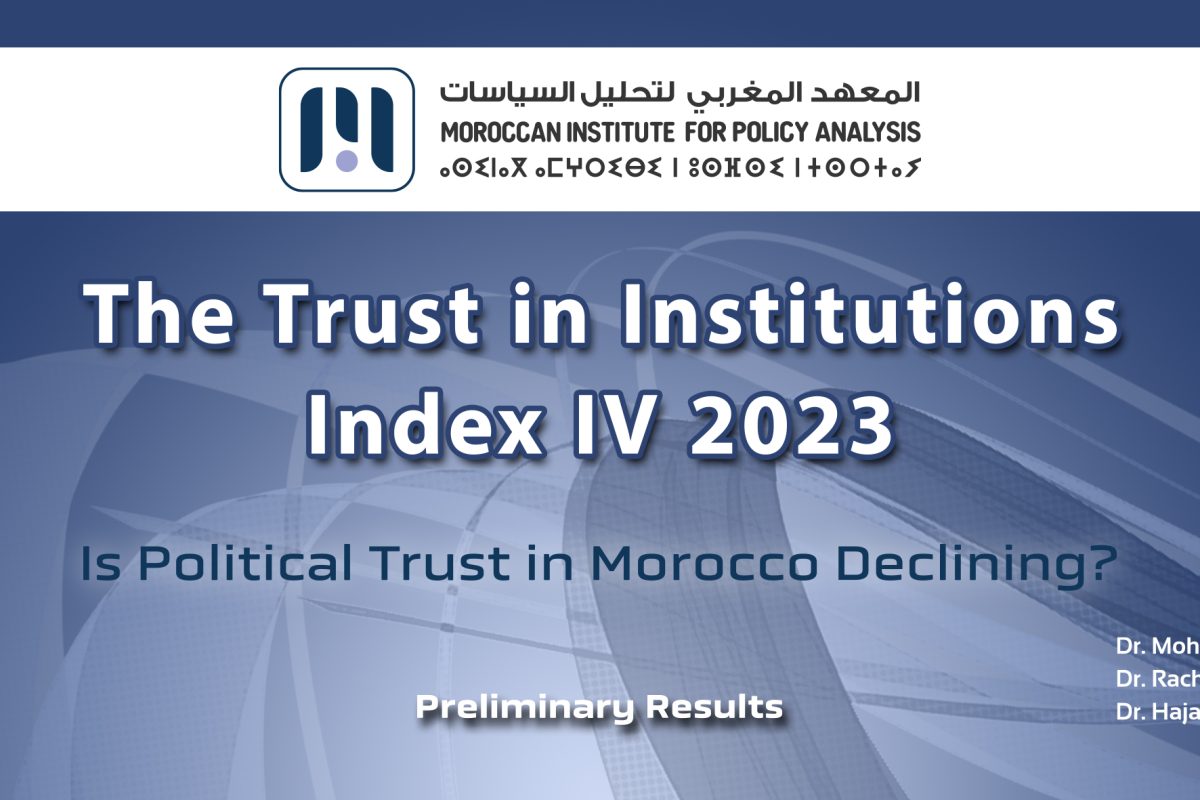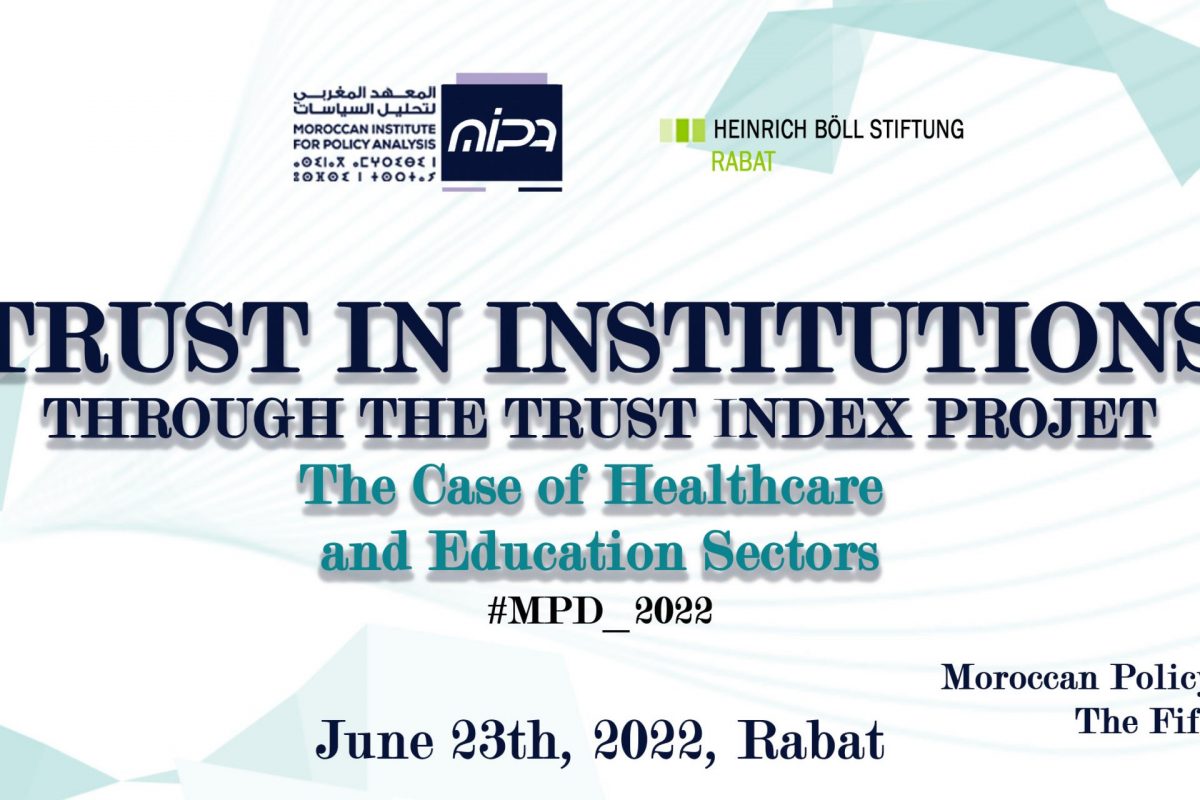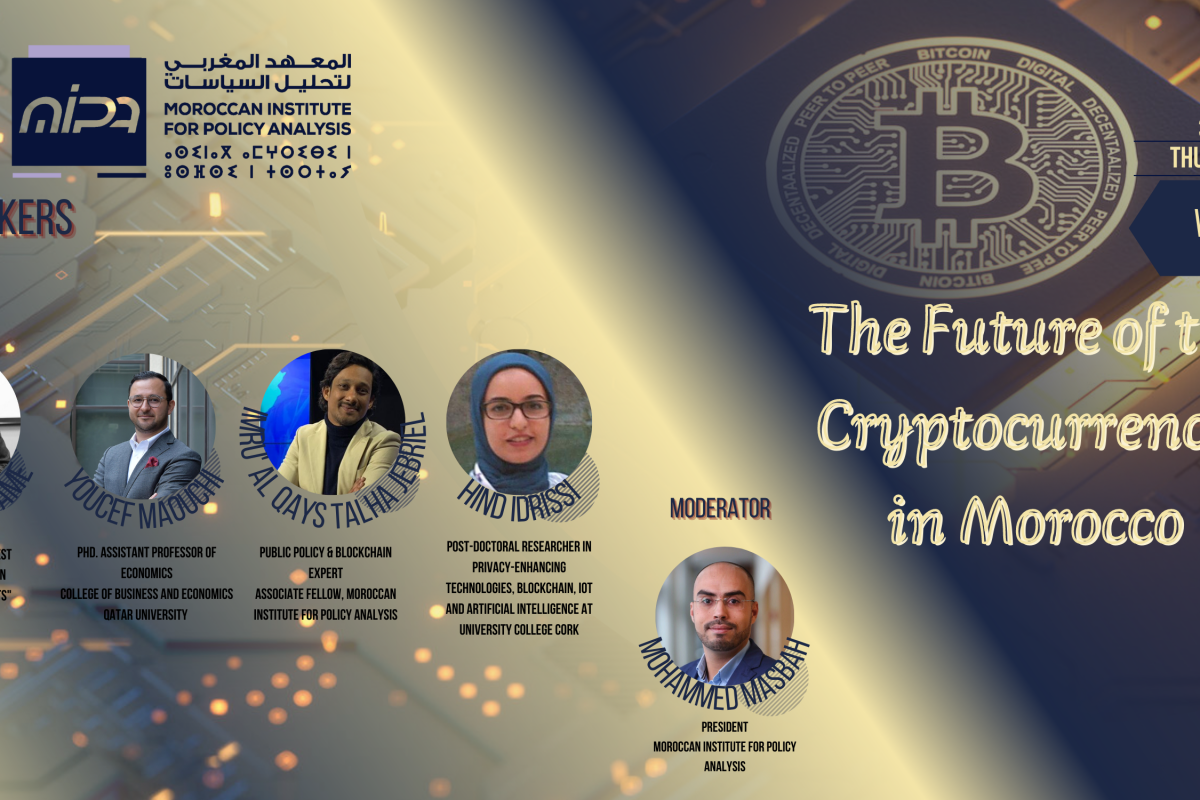Fighting Corruption and Promoting Integrity: Transparency Prospects
Policy Dialogue Series 2021/2022
May 25th, 2022
Background
Recent political and economic events have shaken the foundations of trust between governments and citizens. While it can be partly explained by the financial and economic crisis and increased inequalities, it may also be linked to the emergence of several corruption cases in many countries that erodes trust. The negative impact of corruption on development is no longer questioned. The most harmful consequence of these distortions is that they cause misallocation of resources and retard fundamentals of an economy such as investment, innovation, entrepreneurship, growth, and productivity[1]. According to the World Bank report, the annual amount of corrupt global transactions is generally estimated at $1,000 billion, which is equivalent to 20 % of the global GDP.
Moreover, it fosters an anti-democratic environment characterized by uncertainty, distrust, unpredictability and declining moral values, and disrespect for constitutional institutions and authority. When citizens are forced to pay bribes for government services, to avail themselves of a biased judicial system, or to cede jobs or government contracts to well-connected individuals, their faith in government institutions wanes. Corruption, therefore, reflects a democracy, human rights, and governance deficit that negatively impacts poverty and human security. In the wake of globalization and increased pressures for improving “governing institutions,” development assistance providers began shifting away, from traditional (neutral) public administration reform concerns, to also confront more politically sensitive areas that are at the core of good governance. Since then, improving accountability, transparency, and integrity (ATI), as well as fighting corruption, has been a rapidly growing area of assistance.
Morocco has exerted an endless effort into establishing the legislative, institutional and practical grounds to combat all aspects of corruption and to consolidate transparency and integrity in the public affairs prompted by the negative reflections of aspects of corruption permeating all levels of society, economic, social and cultural. Since the ratification of the 2011 Constitution, Morocco has made its most significant efforts to address the public corruption issues that have long plagued the kingdom and therefore three major legal reforms have been enacted. First, Morocco adopted important whistleblower protection legislation in 2011. This law brought Morocco in line with the international community on the best practices for protecting whistleblowers[2]. Second, Morocco addressed issues surrounding public procurements in 2014 when it passed new legislation that led to the implementation of internationally recognized best practices in the public procurement sector[3]. The reform led to the development of a national procurement training strategy, a central procurement policymaking body, and an online system to help simplify the procurement process.
Third, the constitution also established the National Agency for Probity, Prevention and Fight against Corruption (ICPC), in compliance with the requirements of Article 6 of the United Nations Convention against Corruption[4]. The agency has the mandate to initiate, coordinate and supervise the follow up and the implementation of prevention and fight against corruption policies, to receive and disseminate information in this field, to contribute to the moralization of public life and to strengthen good governance principles, public service culture and the values of responsible citizenship. It has been fully functioning since the nomination of its president in 2018. Fourth, Morocco enacted an access to information law in 2018 that allows Moroccans to petition the government to receive access to certain government documents[5].
Similarly, a wide number of relevant institutions were given wider scopes and/or powers, among them the Human Rights Council, the Competition Council, the Central Commission for the Prevention of Corruption, and the Court of Auditors. Constitutional reforms increasing civil liberties, political participation, decentralization, and judicial independence were promised by the King and overwhelmingly confirmed in a national referendum.
Despite these efforts, anti-corruption policies have not invested much to the appropriate political climate, and to the national mobilization against corruption that has resulted from the interactions of the Arab spring popular movement. Those policies continued to be characterized by the absence of a long-term, practical strategic vision, embodied in a time-bound road map. This was manifested in the delay in launching the National Anti-Corruption Strategy in 2015[6]. Moreover, scoring 40 out of 100 in the 2020 Transparency International’s Annual Corruption Perceptions Index, Morocco is failing to make progress against systematic corruption in its public sector. While measuring and analyzing Moroccans’ level of confidence in various political, economic and social institutions, the Arab Barometer found that 71% of Moroccan respondents suffer from corruption that is spread within state institutions to a large or medium extent[7].
Fighting Corruption
Corruption is an aspect of poor governance that undermines trust in politics and in each other. With regard to fighting corruption, 56% of the respondents said that they are generally satisfied with the government’s efforts to fight against corruption (37% are very satisfied and 19% are somehow satisfied), whereas 44% are not satisfied (28% are not satisfied at all, and 16% not much satisfied). See Graph 1

Graph 1
However, 94% of the respondents argue that bribery is widespread in Morocco (66% said extremely widespread and 28% said somehow widespread). See Graph 2

Graph 2
This is actually reflected in citizens’ perceptions of corruption (bribery, using connections) in public administration. 91% of the respondents assert that giving extra money to the public administration staff to complete a task faster is extremely prevalent (66% said very prevalent and 25% said somehow prevalent). Moreover, 94% claim that using connections to complete a task faster is also prevalent (76% said very prevalent and 18% said somehow prevalent). See Graph 3

Graph 3
Morocco’s low ranking poses a key question about the effectiveness of past policies and the seriousness of the political actors will in fighting corruption in Morocco. Without political will, anti-corruption laws will remain empty shells and anti-corruption authorities will feel abandoned.
Policy Dialogue Themes
- Perceived Level of Corruption in Morocco and Trust in Institutions
In times of uncertainty, trust becomes more important. Particularly, trust in government or political trust is a necessary precondition for representative democracy. The erosion of trust in government is thought to indicate “the crisis of democracy” with direct and severe consequences for the quality and ability of representative democracy, its institutions, and its actors. Over the last decade, Morocco has gone through progressive changes into democratization. Despite efforts undertaken, a lack of transparency and accountability affect citizens’ perception of political institutions. While citizen’s participation is embedded within the constitutional structure of Morocco, the political and economic institutions are experiencing a crisis of trust in their relations with citizens.
In the Trust Index report (2020 and 2022) published by the Moroccan Institute for Policy Analysis (MIPA), 56% of the respondents said that they are generally satisfied with the government’s efforts to fight against corruption (37% are very satisfied and 19% are somehow satisfied), whereas 44% are not satisfied (28% are not satisfied at all, and 16% not much satisfied). However, 94% of the respondents argue that bribery is widespread in Morocco (66% said extremely widespread and 28% said somehow widespread). This is actually reflected in citizens’ perceptions of corruption (bribery, using connections) in public administration. 91% of the respondents assert that giving extra money to the public administration staff to complete a task faster is extremely prevalent (66% said very prevalent and 25% said somehow prevalent). Moreover, 94% claim that using connections to complete a task faster is also prevalent (76% said very prevalent and 18% said somehow prevalent).
Additionally, this trend is reflected in citizens’ perception of bribery and patronage in the education and health sectors, with the healthcare sector being the largest in terms of perceptions of corruption. As 87% of respondents said that bribery is prevalent in the public health sector (58% said it is very prevalent, and 29% said it is prevalent), and 55% believe that bribery and patronage are prevalent in the private health sector (19% said they are very prevalent, and 36% said they are prevalent). The education sector also has high levels of corruption perceptions, albeit less than the health sector as 48% of respondents believe that bribery and patronage are prevalent in the public education sector (20% think they are very prevalent and 28% believe they are prevalent). Furthermore, 45% of respondents believe that bribery and patronage are prevalent in the private education (17% said they are very prevalent and 28% said they are prevalent).
The corruption status in Morocco can also be studied from judicial follow-ups, in which the report of the Chief Public Prosecutor recorded that the direct line for reporting bribery, since its launch on May 14, 2018 until December 31, 2019, received about 36,138 calls, an average of 110 calls per day[8]. This line led to 117 arrests of suspects, an average of about two cases per week in different regions of Morocco, related to bribes ranging from small amounts not exceeding 50 dirhams to 300,000 dirhams[9]. The sectors concerned with the flagrante delicto cases, are authority officials (30 cases), agents of local communities/municipalities (22 cases), the Royal Gendarmerie, National Security, Civil Protection, Auxiliary Forces, Water and Forests (22 cases), mediators (10 cases), the health sector (9 cases), the justice sector (6 cases), the equipment and transportation sector (4 cases), and other sectors (10 cases). Liberty-depriving penalties and fines were issued[10].
Therefore, high levels of corruption with all its faces (bribery, patronage, favourism, nepotism) have a particularly negative effect on public service delivery and poses a significant challenge to the progress towards sustainable development. Among the questions that need to be addressed are:
- Why has the level of corruption in Morocco not decreased despite the various anti-corruption measures undertaken?
- How do the systems in which they operate facilitate, drive, or discourage corruption?
- How is corruption affecting Morocco’s development objectives?
- What can be done to reduce corruption at the overall system level?
- Fighting Corruptionthrough Effective and Efficient Means
Despite Morocco’s legal arsenal, the institutional system, and the package of measures achieved by the ruling establishment, corruption is still rampant in Morocco, leaving severe economic, social, and moral consequences at the level of Morocco’s image. Losses are estimated at between 5% to 7% of GDP, or at least one-quarter of the state budget and three times the budget of the National Initiative for Human Development[11]. Thus, prevention is better than a cure. This is also the case in fighting corruption. By focusing on corruption prevention, the impact of corrupt behavior can be reduced. For example, effective corruption prevention can: reduce opportunities for tax evasion thus increasing revenues; ensure a more even playing field for the private sector by limiting unfair advantages in winning contracts or achieving business licenses, and reduce leakage of public funds destined for delivering health and education services or building roads and other critical infrastructure. As such, reducing corruption requires a specific approach where certain measures include[12]:
- Developing and implementing anti-corruption policies and practices;
- Ensure the existence of a body or bodies to implement prevention policies and share anti-corruption knowledge;
- Maintaining proper systems for the recruitment, hiring, and promotion of public officials;
- Enabling the reporting of corrupt conduct;
- Building an effective system of procurement, based on transparency, competition, and objective criteria in decision-making;
- Maintaining the integrity and independence of the judiciary and prosecution services;
- Promoting the participation of civil society and individuals in the fight against corruption
Among the questions that need to be addressed:
- What do anti-corruption bodies do to fight corruption?
- What can be done to build integrity among future generation?
- Why the National Integrity Commission Law did not enter into force yet?
Objective
The main objective of this policy dialogue is to:
- Reflect on ongoing developments in Morocco and the emerging public demands with a view to identifying actionable linkages with the anti-corruption agenda;
- Map out challenges in the implementation of anti-corruption measures and share lessons learned on practical ways to overcome them;
- Help ensure that roadmaps for reforms are developed through participatory approaches and integrate anti-corruption measures in wider reforms in government and the private sector.
Target audience
The dialogue targets:
- Policy Entrepreneurs: who have a vested interest and resources in the policy issue (policymakers, technical experts in the policy area, researchers, professionals, civil servants)
- Other stakeholders: NGOs, research institutions, professional associations, local funding partners, and other civil society organizations that also have key roles to play through aligning their aims and activities with the overall policy and planning cycle. These groups of actors also have an important advocacy role, i.e., bringing attention to priority issues and offering options to solve them.
While the participants meet in person, the event is conducted under Chatham House Rule, which means “When a meeting, or part thereof, is held under the Chatham House Rule, participants are free to use the information received, but neither the identity nor the affiliation of the speaker(s), nor that of any other participant, may be revealed.”
About The Moroccan Institute for Policy Analysis (MIPA)
The Moroccan Institute for Policy Analysis (MIPA) is a non-profit independent policy research institution based in Rabat, Morocco. Founded by a group of trans-disciplinary researchers, MIPA’s mission is to produce systematic and in-depth analysis of relevant policy issues (political, social, economic, and cultural) that lead to new and innovative ideas for solving some of the most pressing issues relating to democracy.
MIPA’s main activity is to produce systematic, in-depth, accurate and impartial analyses of policy relevant issues. MIPA publishes findings and analyses in the form of policy briefs, research articles and thematic reports. All our publications are published in our website: https://mipa.institute/ar or https://mipa.institute/eng
Each year, MIPA organizes an annual policy forum, bringing together researchers, policymakers, and government officials to discuss, debate, and reflect on a specific policy theme.
The third main activity of the MIPA is to train young activists, researchers and academics in the policy analysis domain. The aim of the training is to prepare the next generation of researchers and academics to take the next step in their careers and build their skills to produce in-depth effective analyses of policy relevant matters. MIPA´s main goals and objectives are translations of what MIPA stands for. Through its work and the different activities it organizes, MIPA seeks to:
- Contribute to the public debate on political issues;
- Publish policy papers, analytical articles and thematic reports;
- Provide advice and expertise to governmental and civil society organizations;
- Promote research ethics;
- Encourage analytical and critical thinking;
- Prepare young researchers and academics to take the next step in their careers;
- Encourage cooperation between the different public and non-public research institutions with shared interests and values.
MIPA’s Public Policy Dialogue Series 2021/2022
The Public Policy Dialogue series 2021/2022 is a formal forum organized by the Moroccan Institute for Policy Analysis (MIPA). It is held monthly, gathering participants from the government, development partners, international institutions, researchers, experts and civil society to discuss emerging public policy issues, challenges and constraints of implementation in the context of Morocco.
The purpose of these series is to deepen awareness and introduce a profound critical policy dialogue between the specialists in the domain of public policy analysis and decision-makers to achieve a thorough diagnosis of policies, multi-sectoral and community-based strategies while constructively criticizing them, proposing policy alternatives and thinking of potential options. These dialogues also provide an opportunity to inform the broader discourse, build consensus and improve understanding on pertinent issues. Therefore, every participant plays a role as both a knowledge holder and knowledge recipient and actively engages in a thought-provoking, frank and constructive discussion.
While the participants meet in person, the event is conducted under Chatham House Rule, which means “When a meeting, or part thereof, is held under the Chatham House Rule, participants are free to use the information received, but neither the identity nor the affiliation of the speaker(s), nor that of any other participant, may be revealed.”
The Public Policy Dialogue series 2021/2022 hope to get a structured dialogue that will create both the learning opportunity and the space for collaboration and joint problem solving. Each policy dialogue event will maintain a half/one day (3-6 hours) time frame in respect of the heavy workload of participants but limit the reporting component of each meeting as well as the number of subjects to be considered overall. A few weeks following each policy dialogue, a policy brief will be produced and disseminated, summarizing the main points discussed and suggesting recommendations to be followed. The brief will be written in Arabic and English languages.
Points of Contact:
Hajar Idrissi, Project Coordinator
Email: h.idrissi@mipa.institute
Rachid Aourraz, Director of Research
Email: r.aourraz@mipa.institute
Moroccan Institute for Policy Analysis (MIPA)
5, Rue Figuig, Rabat, Morocco
Email : contact@mipa.institute / Phone : +212.5.37.26.26.02
Website: https://mipa.institute
Endnotes
[1] Shleifer and Vishny 1993, Mauro 1995, Fisman and Svensson 2007
[2] Morocco: Whistleblowing Overview, Transparency International, 3 (2016) (describing Morocco’s Whistleblower protection law passed in 2011 to comply with the United Nations Convention on Corruption) available at https://www.transparency.org/whatwedo/publication/morocco_whistleblowing_overview.
[3] World Bank. https://openknowledge.worldbank.org/bitstream/handle/10986/20553/901440BRI0Box30coll0KNOWLEDGE0NOTES.pdf?sequence=1&isAllowed=y
[4] OECD,2020. https://www.oecd.org/mena/competitiveness/Global-lessons-on-collective-action-against-corruption-Case-of-Morocco.pdf
[5] https://www.mmsp.gov.ma/uploads/documents/Guide_DAI_VersionFrancaise.pdf
[6] Mohamed Berrou, 2018. https://mipa.institute/6551
[7] Arab Barometer. 2019. https://www.arabbarometer.org/wp-content/uploads/ABV_Morocco_Report_Public-Opinion_Arab-Barometer_2019.pdf
[8] https://www.alquds.co.uk/%d8%a7%d9%84%d9%85%d8%ba%d8%b1%d8%a8-%d8%aa%d9%82%d8%b1%d9%8a%d8%b1-%d9%8a%d9%83%d8%b4%d9%81-%d8%a3%d9%86-%d8%b7%d8%b1%d9%8a%d9%82-%d8%a7%d9%84%d9%82%d8%b6%d8%a7%d8%a1-%d8%b9%d9%84%d9%89-%d8%a7%d9%84/
[9] Ibid
[10] Ibid
[11] Mohamed Berraou, 2018. https://mipa.institute/6551
[12] World Bank, 2020. https://documents1.worldbank.org/curated/en/235541600116631094/pdf/Enhancing-Government-Effectiveness-and-Transparency-The-Fight-Against-Corruption.pdf
MIPA Institute
MIPA is a non-profit independent research institution based in Rabat, Morocco. Founded by a group of transdisciplinary researchers, MIPA’s mission is to produce systematic and in-depth analysis of relevant policy issues that lead to new and innovative ideas for solving some of the most pressing issues relating to democracy.


